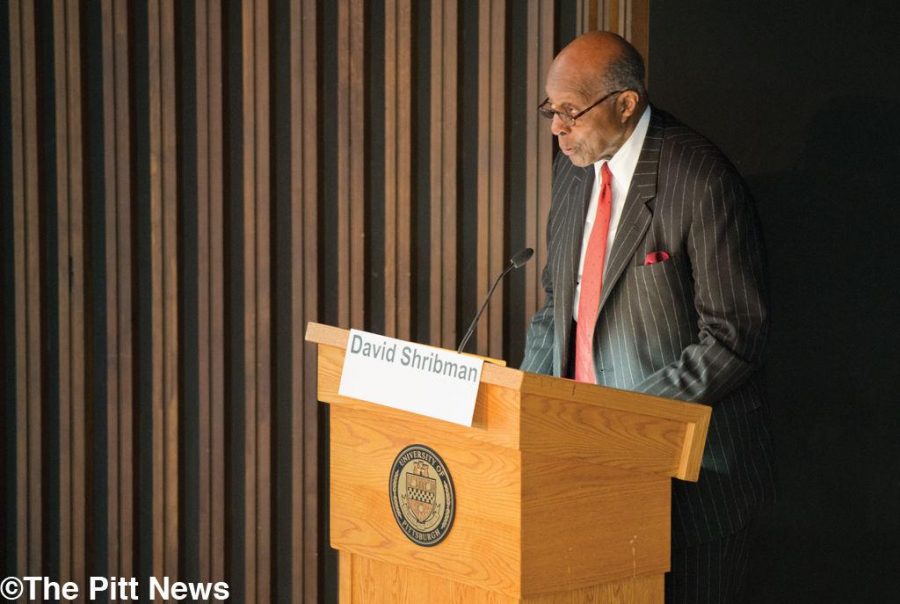A look back to move forward
March 2, 2015
On May 30, 1980, a white supremacist shot Vernon E. Jordan in the back in Fort Wayne, Ind.
The first telegraph he opened after his surgery was from George C. Wallace, then-governor of Alabama whose campaign for office trumpeted segregation.
“I am happy your life was spared,” Wallace’s wire to Jordan, a black man, read.
Years later, the two met again at an event at which Jordan spoke at and Wallace asked Jordan to give him a hug.
Jordan, 79, shared his personal crusade at a panel discussion on Monday about the “transformative” race movement that started 50 years ago, its progress and the pervading pessimism. About 250 people gathered in Alumni Hall for the event presented by Pitt’s Honors College titled “A Half Century of Struggle and Success: A Civil Rights Retrospective.”
David Shribman, executive editor of the Pittsburgh Post-Gazette, moderated the event and started the night by taking the audience back half a century.
“At no other time has the nation so transformed itself. [Our country] came so much closer to achieving the promise of America that all men and women be treated equally,” Shribman said.
The panel included Jordan, former president of the National Urban League; Dorie A. Ladner, a Freedom Rider activist and Freedom Summer organizer; Larry E. Davis, a dean at the School of Social Work and director of the Center on Race and Politics at the University of Pittsburgh; and David J. Garrow, a professor of law and history and distinguished faculty scholar at Pitt’s School of Law.
Despite the societal progress paved during the 1960’s, the participants of the panel discussed the “rubble” remaining after civil rights activists tore down the “sagging wall of segregation,” as Jordan said.
“The [young people of this generation] need to continue to work, to keep the things we’ve done alive,” Ladner said. “The world isn’t bad, but it’s up to us to make it a better place.”
Ladner grew up in the heart of the Civil Rights movement in Hattiesburg, Miss., and jumped in the fight at a young age. Growing up, Ladner didn’t have any electric lights or an indoor toilet in her house, and she traversed dirt roads to school where she studied from third-hand books. She dropped out of college to increase her involvement with the Civil Rights movement. She endured the deaths of her Civil Rights partners and friends, one of whom was assassinated. But, despite these struggles, she has an optimistic outlook on the struggle for equality.
“As a 14-year-old, I got to attend NAACP meeting in Jackson, Miss. If we had been so pessimistic, we would not have been able to make strides. We had to live by faith,” Ladner said. “If you watch Animal Kingdom and see the hyenas that draw lines in the sand, I crossed the line in the sand and started fighting.”
Similarly, Jordan drew on his experience growing up as a black American during the Civil Rights movement to fuel his optimism.
“That kind of transformation repeated millions of times over is the legacy of Martin Luther King Jr. and the movement he helped lead,” Jordan said. “If we walk the path he showed us, letting our infinite hope drive meaningful action, then I believe deep in my heart we shall overcome.”
Jordan opened the panel with a reminder that the work Martin Luther King Jr. started was not yet over, and that King would have mixed feelings about the society he saw today.
“[Martin Luther King Jr.] would shed tears of joy to see black CEOS … but he would shed tears of sorrow to see the toll that poverty, hunger and homelessness is having on too many Americans,” Jordan said.
The other members of the panel also expressed disappointment with racial disparities in the United States.
“I like to be optimistic, but I’m not so optimistic about [the current movement] because the problem is larger than just the United States. It’s a world problem,” Davis said. “I wish the whole Civil Rights movement had taken place two or three decades before it did.”
Davis sees the declining economy as a roadblock to achieving equality.
“I don’t think the country is doing well, so I don’t think the economic opportunity is there,” Davis said. “I think the whites are scared and insecure about their own economic futures, but [the whites] were more giving when the economy was hot.”
The root of racism grows, Davis said, from the profitability for whites to exploit blacks, and, in order to justify this behavior, they had to change their attitudes to match it.
“It dawned on me that racism is functional. These people weren’t sick, they weren’t crazy, and most of them weren’t dumb,” Davis said. “The reason it’s been so hard to change is because it made sense for them not to change … As long as there is a need for [whites] to exploit [blacks], they will do so.”
Garrow, whose biography about King earned a Pulitzer Prize, was equally pessimistic.
“Liberalism and democracy are in far worse shape today than they were 25 years ago,” Garrow said. “I’m very definitely on the side of pessimism.”
While Jordan and Ladner said the path to success lay in continued efforts to increase voting and black representation, Garrow championed a decrease in gun violence and more employment opportunities for ex-offenders as a solution.
Regardless of the solution, all four panelist members agreed that, at this time, society must acknowledge the progress that has been made and focus on the changes that it still needs.
“For Martin, there would be tears of joy and tears of sorrow [looking at this nation of ours in this century],” Jordan said. “But there would not be resignation. He would care less about the monument in his name than he cares about the millions [of people] still left behind.”



